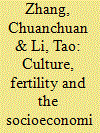| Srl | Item |
| 1 |
ID:
156471


|
|
|
|
|
| Summary/Abstract |
This paper aims to study the effect of culture on economic outcomes by focusing on one unique fertility norm in China: the belief of continuing the family line. Using the national representative household survey data, we successively examine the fertility behavior and socioeconomic status of women in regions of China with varying beliefs regarding continuing the family line. We show that this local fertility norm has positive and significant effects on the fertility behavior, including the number of births; sex selection biased towards boys; and the education, employment status, and income of women. We also show that the gender gaps in education, labor supply, and income are significantly larger in regions where the belief of continuing the family line is stronger. Our results are robust to the control for reverse causality issue by measuring the local fertility norm using the beliefs of the older generation.
|
|
|
|
|
|
|
|
|
|
|
|
|
|
|
|
| 2 |
ID:
192411


|
|
|
|
|
| Summary/Abstract |
Using longitudinal data from the 2014–2018 China Family Panel Studies, we investigate the impact of internet use (IU) on fertility among reproductive-age women. We find that IU reduces the number of children born, with more pronounced effects among those with a moderate level of education, those aged 16–19, rural residents, and those who are married. These results are robust to alternative IU measures and a series of estimation approaches that control for endogeneity. IU participation affects the number of children born through decreased marital satisfaction, changed attitudes toward traditional gender roles, a reduction in the importance placed on ancestral lines, deteriorated health and reduced fertility preferences.
|
|
|
|
|
|
|
|
|
|
|
|
|
|
|
|